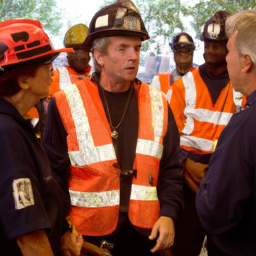On September 11, 2001, the United States faced one of its darkest days in history when terrorists attacked the World Trade Center in New York City and the Pentagon in Washington, D.C. The president at that time was George W. Bush, who had been in office for less than a year. This article will explore the actions and decisions made by President Bush during this tragic day and the impact it had on the nation and the world.
As the attacks unfolded, President Bush was in Sarasota, Florida, visiting an elementary school to promote his education policy. Upon hearing the news of the first plane hitting the World Trade Center, Bush was informed by his Chief of Staff, Andrew Card, who whispered in his ear, "A second plane hit the second tower. America is under attack." The president's initial reaction was one of shock and disbelief.
Bush was quickly ushered into a secure room where he began making phone calls to gather information and coordinate a response. He spoke with Vice President Dick Cheney, who was in the Presidential Emergency Operations Center (PEOC) in Washington, D.C., as well as New York City Mayor Rudy Giuliani and New York Governor George Pataki. During these conversations, Bush made it clear that his priority was ensuring the safety of Americans and bringing those responsible for the attacks to justice.
Despite the chaos and uncertainty, President Bush addressed the nation from the school, stating, "Today, we've had a national tragedy. Two airplanes have crashed into the World Trade Center in an apparent terrorist attack on our country." He then returned to Air Force One, which took off and began flying to various undisclosed locations for security reasons.
During the flight, Bush was in constant communication with his team, including National Security Advisor Condoleezza Rice, Secretary of State Colin Powell, and Secretary of Defense Donald Rumsfeld. The president also received updates from the Federal Aviation Administration (FAA) regarding additional potential hijackings and the grounding of all civilian flights in the United States.
By the evening of September 11, President Bush returned to the White House and addressed the nation once more. In his speech, he condemned the attacks, stating, "These acts of mass murder were intended to frighten our nation into chaos and retreat. But they have failed. Our country is strong." He also vowed to bring the terrorists to justice and protect the American people.
In the days and weeks that followed, President Bush worked closely with his advisors to develop a comprehensive strategy to combat terrorism. This included the creation of the Department of Homeland Security, the passage of the USA PATRIOT Act, and the launch of military campaigns in Afghanistan and Iraq, which aimed to dismantle terrorist networks and prevent further attacks.
As the country continued to reel from the attacks, President Bush also played a crucial role in comforting and uniting the nation. He visited Ground Zero in New York City, where he spoke to rescue workers and first responders, telling them, "I can hear you, the rest of the world hears you, and the people who knocked these buildings down will hear all of us soon."
Throughout his presidency, George W. Bush continued to prioritize national security and the fight against terrorism, which had become defining features of his time in office. The events of 9/11, and the president's response to them, would leave a lasting impact on the United States and the world.
In conclusion, President George W. Bush's actions during the tragic events of September 11, 2001, demonstrated his commitment to the safety and security of the American people. While his decisions and policies in the aftermath of the attacks remain a subject of debate, there is no denying the significant impact his leadership had on the nation during one of its darkest hours.
